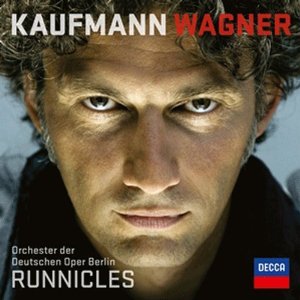 Artistic
Quality: 10 Artistic
Quality: 10
Sound Quality: 10
This should clinch it: Jonas
Kaufmann is the pre-eminent Wagner tenor of this generation. (Slated to sing
Manrico soon, and judging from his Werther, he may just be the pre-eminent
tenor, period.) For those who haven’t heard him, the voice is dark and
manly, with easy ascents above the staff at all dynamic ranges (including
some crooning that can become more like a mannerism than a service to the
music), a top that rings loud and clear, phrasing that confirms great
musicianship, a smooth legato, and flawless diction. When he sings softly
for a period you are stunned by the power he can muster, and vice-versa. And
the sound itself is beautiful—fully rounded, lustrous.
Rienzi’s
prayer is inward, pious, and sung with seamless bel canto line; conversely,
Tannhäuser’s Rome Narrative is tortured, enraged, and jagged, missing just a
smidge of the insane coloring that, say, Wolfgang Windgassen gives to the
Pope’s cruel edict. His Grail Narration from Lohengrin, sung complete with
second verse, begins softly, seemingly in mid-air, and builds to a
passionate climax. Siegmund’s first-act monologue, “Ein Schwert verhiess mir
der Vater”, is delivered with ardor, dark, secure tone, and staggering
breath control on the huge outcries of “Wälse”, probably not matched by any
tenor since Melchior and Vickers. And his Siegfried is full of wonder in the
Forest Murmurs, sung sweetly and with what can pass for true naiveté. “Am
stillen Herd” from Die Meistersinger makes us want to hear the Prize Song.
The surprise entries here are the Wesendonck Lieder, invariably sung by
mezzo-soprano or soprano. Kaufmann and the marvelous Donald Runnicles, who
leads sympathetically and very much in keeping with his tenor’s strengths
and feelings throughout the recital, do not linger morbidly or unnecessarily
over each song; nor are they rushed. Runnicles allows the freshness of
Kaufmann’s soft singing to take center stage (listen to “Traume”—it’s
gorgeously dreamy) and he makes certain that the transparency in Wagner’s
orchestration is at the fore. The understanding that they both—and Kaufmann
in particular—bring to these songs never seems out of place; the fact that
it is a man’s voice never jars. The sound on this recording and the playing
of the Orchester der Deutschen Oper Berlin are peerless. As the joke goes, I
wish I could jack up the scorecard and give this CD an “11-11”.
|